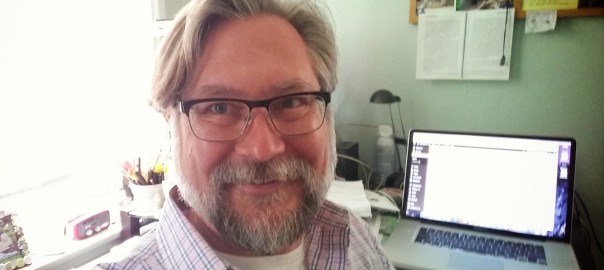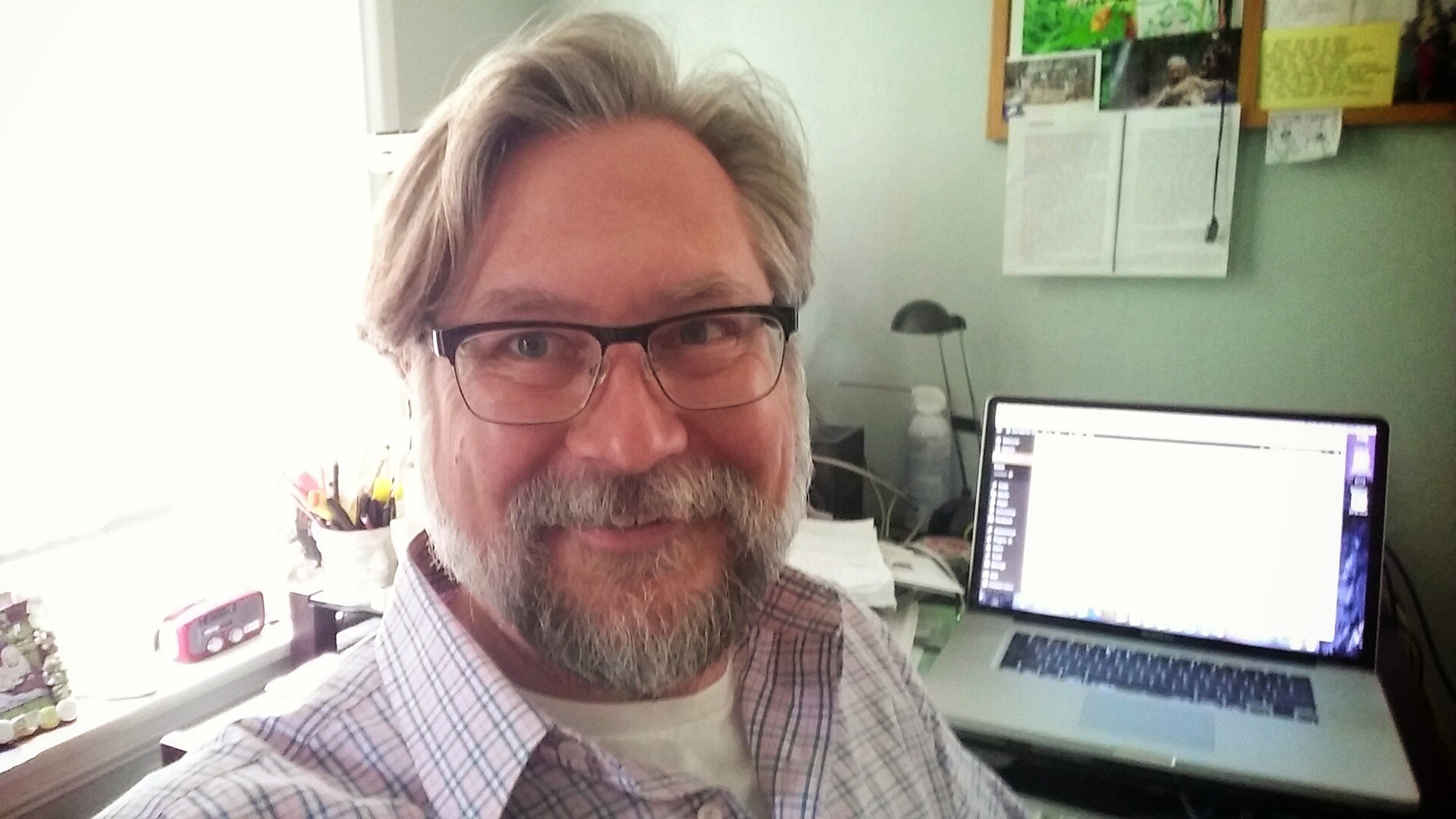A person I know quite well — and with whom I recently have had several lengthy conversations about my current state of affairs — offered an interesting appraisal of her understanding of my health and well-being to my wife. She said, rather unceremoniously, that she had expected me to be dying. In fact, she seemed quite surprised (and possibly a bit put off) by how healthy I appeared. Turns out, I have news for her:
In fact, here I am, looking quite well (and dare I say “dashing”) in my new progressive lenses picked up today to aid my aging eyes. True, after over 15 years of having a stable prescription, the chemotherapy seems to have begun affecting my vision ever so slightly, at least in the first couple of feet. So this minor side effect has required me to jump straight into trifocal territory. Aside from the minor “swimmy” effect of turning my head side to side while looking through the “mid-range” section, these are actually quite amazing. But that isn’t really what this entry is about, so I’m going to move along.
The thing that most startled me, and which I actually took some offense at, was the notion that a person who is not stupid managed to ignore virtually everything that she had been told about my condition, the state of cancer research and, perhaps most importantly, why statistics do not tell a whole story, or often even a remotely correct one. And what did this person rely upon to make up her mind about what I was going through and my prognosis for continuing life?
A few articles in a newspaper and, surprise, surprise, the Internet. What did this information tell her? That I would be dead within a year. That is what she read, even if there isn’t anything out there that could objectively have given her that information — because that isn’t at all how things would have played out.
Let’s establish some ground rules of understanding here.
- Statistics are inherently misleading.
- This includes info on so-called “survival rates.
- Most statistics on cancer “survival” are based on information that is a decade old, meaning that the treatments in question are even older.
- All medical statistics are outdated by the time they are published.
- This does not make them useless — but one must know how to interpret them and what they really mean in order for the numbers to be useful. More importantly, the reader should know what the statistics do not mean before any judgements are made.
- A random article, whether in print or online, cannot tell the whole story for every patient.
- Even if the article is from a legitimate scientific journal, chances are it represents only a specific study or treatment.
- Most articles appearing online are written by people with little or no medical or scientific background. Vetting the author is always helpful when determining whether the article itself is a trusted source. Even easier than that is vetting the publication.
- Most articles appearing online are pure junk journalism at best. And by this, I truly mean the vast majority. There is a lot of good stuff out there, but even more hack work that has been copied and pasted in copious amounts without any fact checking. Go figure. People read that garbage, support those pages and regurgitate it as “proof” of all sorts of nonsense. All of which indicates that we need more effort put into teaching Critical Thinking Skills in our schools, and more science in our curriculum.
- Cancer is not an automatic death sentence, and even if the prognosis is dire it is not an excuse to either give up living or to assume that the patient is simply goingto be written off as a lost cause.
- New treatments appear quite frequently, and the rate at which they are successfully implemented has risen exponentially over the past ten or twenty years.
- This is a direct result of scientific diligence, in spite of what many in the “alternative medical industry” would have you believe. In fact, nothing in the world of alternative medicine is actual medicine and there have been no advances to actually help cancer patients that have come out of the alternative medical industry in spite of the billions of dollars that have gone into the pockets of those who sell the alternatives. This paragraph bears a second read to anyone who thinks that the Western Medical Complex is out to take advantage of cancer patients. Here is a relevant fact: 100% of advances in effective cancer therapies have occurred within the domain of Western Medicine. Chew on that before blaming oncologists and pharmaceutical companies for keeping a cure out of reach.
- There may be no “single cure” or “magic bullet” for Cancer in general, but that is because there are hundreds of different cancers, and they all behave differently. They respond differently to drugs. They behave differently in the body. They leave different markers in the system, have different recurrence rates, different approaches to growth… Some are malignant and some are benign. Some are going to kill their host and some are not. The amazing thing about Western Medicine is that it has made it much more possible for cancer patients to, quite simply, live long enough to die of something else entirely.
- New treatments appear quite frequently, and the rate at which they are successfully implemented has risen exponentially over the past ten or twenty years.
- People die all the time, of all sorts of things. Sitting around expecting a person with cancer to die is ridiculous when we do this crazy thing called driving every day. Have you looked up the odds of being killed in a car accident, or by a random shooting in a mall or school or local neighborhood, or being squashed by a hippopotamus? These are all legitimate dangers. They happen, quite literally, every day. There are millions of ways to die, unexpectedly, even if you never happen to walk out your door. But we don’t dwell upon those when it comes time to live our lives, unless we are mentally ill, clinically depressed, and generally paranoid. Instead, we gather ourselves up every day and experience what the world has to throw at us. Hopefully in a joyful manner. (That goes for both the throwing and the catching.)
So why is it so easy for people to look at some random statistics and come to a pat conclusion about something that they know essentially nothing about? The answer is pretty clear. It is a combination of societal laziness (associated with a lack of critical thinking skills) and an outdated narrative that is still treated as Gospel in spite of its lack of modern relevance. People hear the word CANCER and all hope drops through a big, imaginary hole in the floor. Just the mention of the word is all it takes, too. Doesn’t seem to matter what type of cancer it is, because to most people there is only one. It is THE disease, rather than an umbrella term for hundreds of conditions. And it is much easier for most people to keep it that simple, even though there is a pretty solid chance they already know someone with some form of cancer.
Why, this past month, we discovered that there were at least three other unrelated cases of different cancers diagnosed on two blocks of our street in the past year (and just our side of the street, too). That is a year, by the way, that I had already been living with Stage 4 Cancer, though the first couple of months I didn’t know it yet. Had I known it, and had I been a true believer in statistics, I suppose I should be dead now. But here I am, still making plans for tomorrow.
•••••
As a side note, not everyone who gets a cancer diagnosis loses sight of their dreams. Some people decide to go on with business as usual, others are inspired to change their lives. Here is a documentary I just heard of the other day about one man’s quest to beat the clock and realize his lifelong ambition. Granted, he’s definitely playing the fabled Cancer Card to jump to the front of the line, but I’m not going to fault him for that. It’s a cutthroat industry and we all have to apply the tools we have at our disposal. But look at it this way, too: being a comedian sucks until you get a TV, movie or book deal out of it, and even then it is a thankless gig except for the few who find staying power through more than just a little bit of luck and time-ing. Time-ing. Timing! It’s really all about the timing.
Meanwhile, here is a public service message from Thailand:
And if you really want to wonder about all of the things we are exposed to over the years, whether we should trust big industries or even the government to always have our backs when it comes to health protection, check out this article. The truth is, Western Medicine can hardly keep up with Big Industry and Lax Oversight. That may be bad news, but the Good News is that it keeps trying and the progress is amazing.
Put your faith in science, Folks. Salvation lies in an intelligent approach to the problems that come at us, whether they be medical or otherwise. Critical thinking goes a long way, just as a healthy dose of rational optimism and perseverance can get us up and going each and every day.

